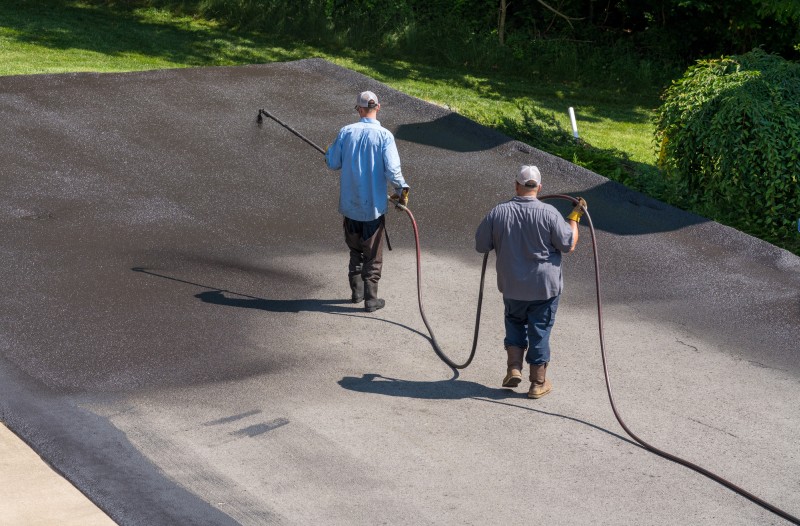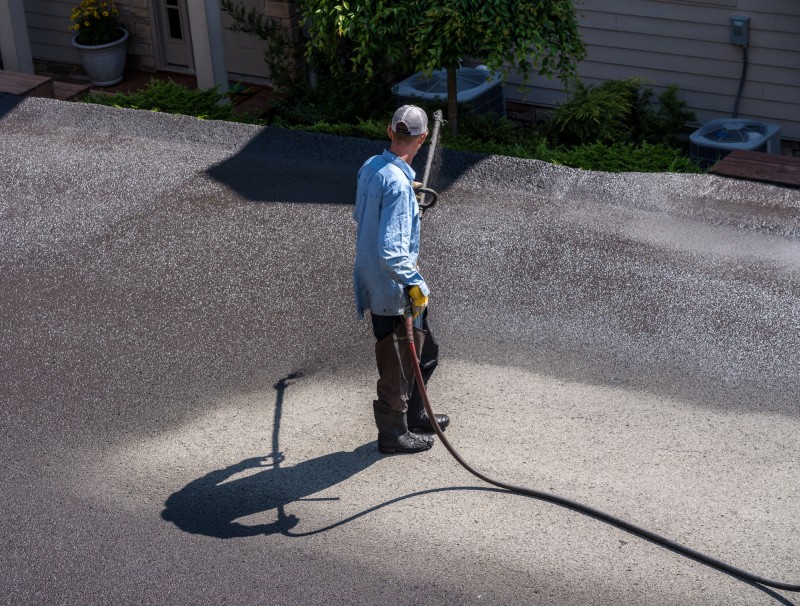In this article we’ll discuss asphalt driveway sealing, the pros and cons of sealcoating your driveway as well as the process to perform such a task, things to consider before sealcoating and much more, so let’s get started.

For anyone who has a driveway that’s been paved with asphalt, sealcoating (also known as pavement sealing) is the process that extends the life of a driveway by applying a protective coating to the surface.
Therefore, no matter how many weather-related fronts hit the area — or how much damage results from oil spills and U.V. damage — sealed driveways rebuff anything Mother Nature (or man) throws its way.
But, what is Asphalt Sealcoating? Let’s discuss this in more details below:
What is Asphalt Sealcoating and How Safe is it?
Marketed as a protective coating that has been proven to extend the life and integrity of any asphalt surface, sealcoating may also give protected surfaces anti-friction and anti-skid properties “associated with the exposed aggregates in asphalt,” say experts writing for the website The Balance.
Concerns that sealcoating can pollute the environment once surfaces are abraded have been addressed by states, according to the U.S. Geological Survey, but industry groups representing sealcoat manufacturing companies refute those findings, and after performing rigorous reviews and conducting research on these claims, many were found to be erroneous, biased or too generalized to be taken seriously.
That stated, asphalt-based products have proven safer than tar-based ones, which is why some retailers no longer sell tar-based products.
Sealing Materials – Coal Tar vs Asphalt Emulsion
First, it’s important to know that today’s market has given birth to a variety of products that fall under the umbrella of sealcoating formulations.
They consist of refined tar(coal)-based, asphalt-based and petroleum-based options, each of which has advantages and disadvantages. The two main products however include coal tar and asphalt-based.

Contractors tend to use coal tar or asphalt emulsion products most often as stated above. Tar is cheaper to apply but it requires more labor to accomplish the job, and if chemical spills are more of a concern than weather, tar may still be a better choice. Moreover, Coal Tar coating has been in the market much longer.
Asphalt-based emulsions take less time to apply because they’re easier to use and you won’t have to deal with the smelly organic compounds that are the signature of tar applications.
Asphalt emulsion coating is a newer material and its main ingredient is asphalt cement which is then mixed with additional minerals, polymers, and emulsifiers to increase product durability.
Asphalt tends to have higher levels of solids which means the sealant is likely to be of a higher quality, thus delivering more years of protection compared to Tar coating.
Main Pros of Sealing Asphalt Driveways
- Sealcoating is the most cost-effective way to resurface pavement and it extends a driveway’s life.
- Sealing stops moisture, salt, environmental assaults and chemicals from seeping into the driveway surface and undermining the pavement beneath the coating.
- Sealcoating has the power to stop asphalt from hardening but it also has the ability to stop asphalt from crumbling, which is why the sealcoating process can be invaluable to the life of the driveway.
- Sealcoating can immediately improve the appearance of a driveway or other asphalt surfaces. It not only looks better but it can even out not-so smooth surfaces by filling in small cracks and holes when it’s applied.
- Sealcoating is extremely easy to apply using squeegees or sprayers. For homeowners who like undertaking DIY projects, this process could give you the result you seek while also saving money.
Main Cons of Sealing Asphalt Driveways
- According to one industry expert, “not all pavement sealcoat [products] are created equal,” so it is incumbent upon whomever does the job to choose the one that is best suited to the driveway, no easy task for amateurs.
- While asphalt-based sealer is likely to retain its look and seal for 1- to 3-years before reapplication is required, tar-based sealers tend to maintain their integrity beyond 3 years, so again, choosing the right product is critical.
- Sealants are not inexpensive. Top-grade formulations cost around $25 per pail and only cover 300 square feet of surface. Cheaper products (starting at $6 per pail) can be found but may not perform to your standards.
- Things can get complicated if you’re sealing an asphalt driveway that abuts walls and other stationary objects, adding cost and time to the job.
- Environmental concerns continue to be raised. Research conducted by both Baylor University and the USGA (https://www.dykespaving.com/blog/the-dangers-of-sealcoating/) have determined that workers who apply sealants (especially tar-based products) could be exposed to cancer-causing polycyclic aromatic hydrocarbons (PAHs).
What are the Differences Between Asphalt and Blacktop?
These two types of paved surfaces are often mistaken for each other and in fact, in the U.S., the terms are often used synonymously.
But there are differences that can make picking the right sealant more important.
Asphalt is a paving concrete that is found on major highways, interstates and other roads. It’s composed of mineral aggregate, sand and a type of petroleum binder that integrates the mix.
Concrete is machine-mixed, poured and then compressed using a steamroller to create a tight, durable surface that reduces wear and tear on vehicle tires and it even reduces road noise.
Depending upon the weather and other environmental influences, industrial-grade asphalt can last 20 years with regular maintenance.
Blacktop, on the other hand, is another form of paving concrete that requires more stone in the mix, and it must be heated to a higher temperature (around 300-degrees F) in order to integrate raw materials properly.
Once mixed, it is poured onto surfaces and left to cool and harden so stones stick together like glue thanks to the formulation binder.
Blacktop is less expensive than asphalt, but it does not perform as well — nor maintain its integrity for longer periods of time — on surfaces subjected to heavy, constant traffic.
How Often Should a Driveway be Sealed?
This question requires taking into consideration climate conditions that exist from one area of the U.S. to another.
Because both winter temperature drops and searing heat play roles in driveway sealant longevity, on average, writes James Cummings, reporting for the Cox News Service, “concrete driveways should be sealed every four or five years to protect them from water penetration and to prolong their life.”
For mature driveways, Cummings suggests a penetrating concrete sealer because over time, concrete becomes more absorbent.
A penetrating sealer “gets sucked into the surface to create a barrier that keeps water out.” But penetrating sealers are pricey products.
For example, a $90 5-gallon container may only cover 500 square feet, and if the driveway is pocketed with large cracks and/or potholes, adds Cummings, you “might get as little as 200 square feet of coverage.”
If you’ve just installed a new concrete driveway, professionals recommend undertaking the first application of a sealer around one year after the installation of the pavement because it can take that long to property cure the surface.
At that point, you may want to undertake the job every two to three years if wear and tear damage the sealant or unusual weather patterns undermine concrete from beneath the surface.
10 Steps for Sealcoating your Driveway
If you’ve determined that you have the skillset to undertake this job, take these steps to do the job properly:
- Schedule the job at a time of the year when you are most likely to enjoy 48 hours of dry weather.
- Prevent cars/people from walking or driving on the area by placing barricades at the driveway mouth.
- Sweep and power wash the driveway and use a liquid sealer on deep cracks to seal them.
- Remove driveway oil stains using an oil stain primer.
- Fill deep holes with a patching compound. Pack the holes firmly and level out the area.
- Choose the right sealcoat. If you’re in a rush, advanced latex-acrylic sealers dry so fast, you may be able to drive on the surface 4 hours later, according to Popular Mechanics magazine.
- Gear up for the job. Wear safety glasses and “never allow an asphalt driveway sealer to come in contact with your skin,” say professionals at Reliable Contracting. Wear protective gloves and a mask to avoid inhaling hazardous sealer fumes.
- Follow the product manufacturer’s application instructions, using a squeegee or sprayer to do the job.
- Give the sealant from 36 to 48 hours to dry before putting down a second coat.
- After another 36 to 48 hour curing period, remove the barricades but continue to keep tabs on the driveway to make sure leaves or other blowing refuse don’t adhere to the driveway as it dries.
Additional Information
-If your driveway is long and wide, you’ll save time by using a commercial sprayer rather than a squeegee.
-Several thin coats of sealer do a better job of maintaining surface integrity than one thick application.
-For a more professional, finished look, apply each coat in an alternate direction as you would when painting a wall.
-If you worry about slips and falls, mix sand into the sealant to add non-slip texture to the surface.
-If you’re mixing multiple buckets of seal-coating product, prepare successive buckets before running out of the previous one so color uniformity is maintained across the entire driveway.
Resources
https://en.wikipedia.org/wiki/Sealcoat
https://www.thebalancesmb.com/seal-coating-driveways-cost-schedule-benefits-4105289.
https://www.chicagotribune.com/news/ct-xpm-2004-08-20-0408200172-story.html
Related Posts
- Comparison of HardieBacker Cement Board vs Plywood For Tiling Projects
- 15 Main Pros and Cons of PVC Decking – Comparison and Discussion
- 6 Great Alternatives to HardieBacker Cement Board
- Comparison of WonderBoard vs GoBoard Used as Tile Backer Boards
- 12 Different Types of Wood for Outdoor Furniture with Pros/Cons
- 11 Different Types of Natural Stone for House Exterior
It’s good to know that simply power washing the driveway will be enough when preparing it for sealcoating. My father will be hiring a driveway sealcoating service soon because his driveway has suffered a lot of cracks through out the years. One of them was even caused by me when I was a teenager and messing around with the tools in his garage.
I read somewhere to wait until your driveway turns gray to sealcoat your asphalt driveway for the first time. Is there some truth to this? My new asphalt driveway was installed in 2019 and still looks black. I still don’t know when to seal it for the first time especially since there are cons to sealing asphalt. Thanks.
I suggest to wait for a couple of more years to do any sealcoating.